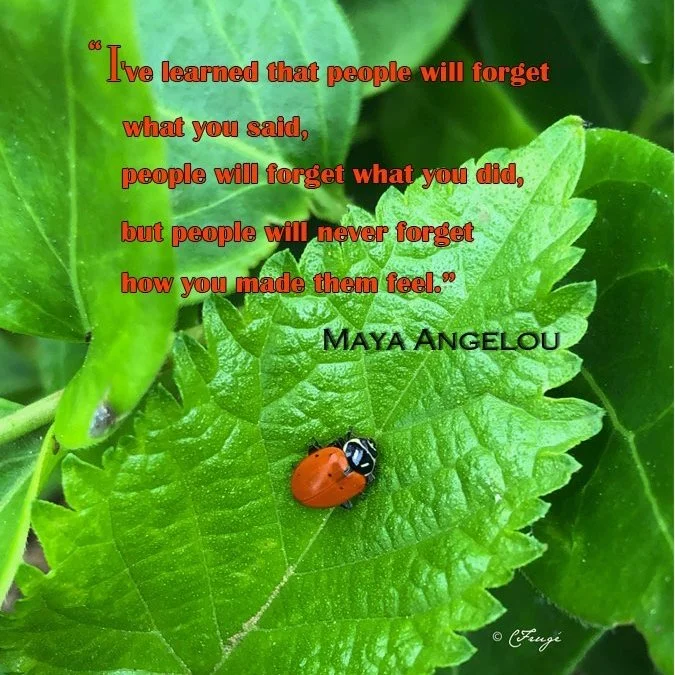Children Need to be Seen and Heard
The proverb “Children should be seen and not heard” dates back to medieval times and was particularly applied to girls. In the presence of adults, children were expected to keep silent. Their opinions and perspectives were unwanted.
Children who experience chaos and trauma especially need to be heard as well as seen by caring adults.
West Spanish Peak, Colorado, elevation 13,626'
Mountains of misunderstanding and the valleys of assumption can exist between children and adults. For the sake of young, immature minds whose imaginations naturally feed fears of the unknown, adults need to climb those mountains and cross the valleys that characterize real life trauma and chaos.
Cuchara Valley, CO
When adults ignore children––remain preoccupied with their own problems, or fail to consider the way their children are affected by those same problems––they deny children a voice. Children internalize the pain not only of their own experience but what also feels like rejection by the very people they need most.
“In the end, we will remember not the words of our enemies, but the silence of our friends.”
Case Studies
In her book, Try Softer, (counselor/therapist) Aundi Kolber writes from her own childhood experience.
“Growing up, I had experienced significant losses . . . and this affected everything . . . I didn’t realize then that our wounds often surface only when at last we feel physically or emotionally safe. Once we are out of survival mode, our bodies, minds, and spirits can bear to consider our stories and the reasons we are so emotionally dysregulated.”
“This affected everything” hardly overstates a child’s point of view. A child’s frame of reference is narrow, life experience limited, and reasoning ability shallow.
Throughout my own childhood, I heard the words again and again, “Children should be seen and not heard.” Those same words spoken to my mother when she was a young girl forced her to turn inward to try to make sense of losses and traumas she experienced.
Both my mother and I were hog-tied, hobbled as children by a crude belief that children should remain silent. Since each of us learned to bury our pain beneath a façade of compliance, we were unable to communicate with each other about the traumatic losses that affected us both.
As an adult, finding my voice and articulating the basis of my impaired emotional development has come through reading and writing and people along the way who listened and helped me heal.
By Faith . . .
As of first importance, reading and studying the Bible has been the anchor for my soul. Taking in the words written by God’s Spirit to reveal who he is, who Jesus is, has helped me to accept how my story fits into his story.
I started reading the Bible as if it were written to me soon after my sister died. When 3 months later my dad was killed in an auto accident, that tiny green Gideon New Testament was a lifeline to this 9-year-old girl who quaked under the covers at night, wondering whether me or my mom would die next.
At the time, it never occurred to a single adult in my life (including my mother) to explore my thoughts, probe my fears, or calm my anxieties.
“For unto us a child is born, to us a son is given, and the government will be on his shoulders. And he will be called Wonderful Counselor, Mighty God, Everlasting Father, Prince of Peace”
Whether you put a comma between Wonderful and Counselor, or after Wonderful Counselor, these words that Isaiah spoke about the savior point to John’s gospel, chapter 1, describing the Savior, Jesus.
“In the beginning was the Word, and the Word was with God, and the Word was God. The same was in the beginning with God . . . and the Word became flesh and dwelt among us, and we beheld his glory, glory of the only begotten of the Father.”
Next, go to the book of Hebrews to read how God’s Son was made like his brothers––a human being.
“in order that he might become a merciful and faithful high priest in service to God, and that he might make atonement for the sins of people. Because he himself suffered when he was tempted, he is able to help those who are being tempted” (Hebrews 2:17–18).
Believing what I have learned from the Bible, by faith and experience I know that Jesus is Wonderful! And he is Counselor. And he is a Wonderful Counselor too!
Through His Word, Jesus counsels and guides, protects and provides, comforts and corrects.
When I couldn’t voice my complaints, doubts, fears and worries to anyone else, Jesus made himself known to me through his word, as if he himself were actually speaking and listening to me.
This isn’t presumption on my part. This is faith stepping beyond the seen and trusting the unseen––like Moses, “as seeing Him who is invisible” (Hebrews 11:27).
Recall that scene in Indiana Jones and the Last Crusade when Harrison Ford, playing Indiana Jones, steps into the void––out onto what appears to be nothing––his steps taken as his father says, “You must believe, Boy.”
“Now faith is the substance of things hoped for, the evidence of things not seen . . . And without faith, it is impossible to please him, because anyone who come to God must believe that he exists and that he rewards those who earnestly seek him” (Hebrews 11:1, 6).
An uncanny parallel between the effects of trauma in Aundi Kolber’s childhood and my own make her writing and her voice resonate. Specifically, she describes the need to “create a healthier inner voice” by forming a secure attachment through a meaningful emotional relationship.
My first secure emotional attachment is to God, taking the Bible as his word to me.
Next, my husband––who God gave me––he has provided a safe heart and listening ear, giving me the freedom to verbalize and process emotions I experienced as a child.
After that, “The second step occurs when we are able to coherently tell our story and understand from our perspective why events happened.”
A New Way to Be
Aundi suggests for healing trauma, the main thing to remember and realize: “It’s over now. Let’s figure out a new way to be.”
Continuing to work on a memoir off and on for the past several years, a coherent story about my life has increasingly taken shape––as I trust in God (Romans 15:13).
I believe my story has meaning and purpose, not only for me, but for the sake of others, especially for those who come after me.
“Children should be seen and not heard,” serves as a pivot point in my story to explain to myself, at least, the burden I feel for children to be both seen and heard.




